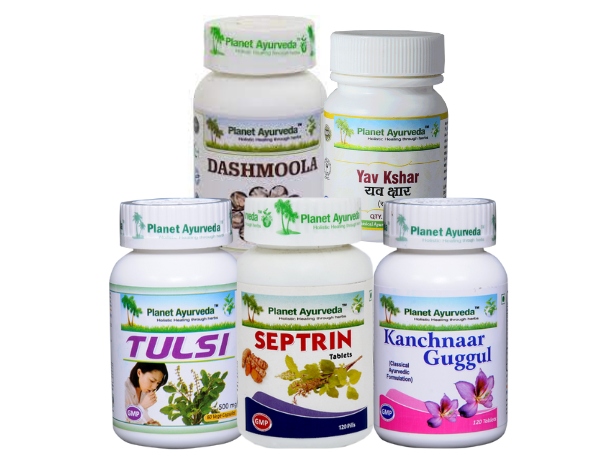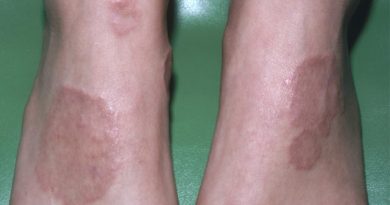Nasal Polyps – Causes, Symptoms and Ayurvedic Treatment
Abstract
Polyp’ term when applied to the nasal cavity is purely a descriptive one, referring to the appearance of an abnormal pedunculated lesion. Nasal polyps are frequently associated with chronic rhinosinusitis, other types of nasal polyps include antrochoanal polyp and neoplastic polyps. In Ayurveda, the term ‘nasa arsha’ has been mentioned by master Sushruta and master Vagbhatta and its correlation is best established with nasal polyps. In the following text, we shall see some details about nasal polyps and its management in the modern system of medicine as well as the traditional system of Ayurvedic medicine. Let’s have a look!!
Introduction
Nasal polyp is a pedunculated hypertrophied oedematous of nose or paranasal sinuses. The nasal polyps are inflammatory in origin but not neoplastic – polypoidal swellings are shaped like polyps but not polyps. Nasal polyps are non-neoplastic masses of oedematous nasal or sinus mucosa. There are a number of predisposing factors that lead to the occurrence of the nasal polyps. Some of the polyps occur due to allergic conditions and others including infections and some other syndromes. In Ayurvedic texts, nasa arsha is mentioned by different masters and also differentiated according to the dosha associated. Mentioned below are some of the causes that lead to the formation of nasal polyp. Later in this text we shall see a detailed view on ‘Nasa arsha’ mentioned in Ayurveda.

Causes of Nasal Polyps
Following are some of the causes of Nasal Polyps:
- The most common association of the nasal polyps is with coexisting asthma, particularly non atopic and late onset. In this subgroup 15 to 20 percent people have nasal polyps.
- Nasal polyps are most commonly found in patients with cystic fibrosis.
- Kartagener’s syndrome.
- The so-called aspirin triad is the association of nasal polyps, asthma and aspirin hypersensitivity.
- Young syndrome.
- Churg-Strauss syndrome.
- Nasal mastocytosis.
- Nasal polyps are also seen in allergic fungal sinusitis.
Predisposing factors
- Allergic reaction
- Vasomotor : Due to imbalance between sympathetic and parasympathetic nerves of the nose.
- Infection : Long standing bacterial and viral infection
- Mixed causes
- Bernoulli’s phenomenon (Negative pressure in the sinuses)
- Polyp saccharides changes in the ground substance.
Types
There are two types of Nasal Polyps
- Antrochoanal polyp : It arises from the maxillary antrum, grows towards the back of the nose (posterior nares) and reaches nasopharynx and oropharynx.
- Ethmoidal polyp : It is multiple, bilateral, arises from the ethmoid sinus and grows towards anterior nares.
Signs and symptoms
Following symptoms are experienced by the patient with Nasal Polyps
- Principal symptoms of nasal polyps are nasal obstruction.
- Reduced or loss of sensation of smell.
- Patients with associated chronic rhinosinusitis have additional symptoms such as nasal discharge and facial discomfort.
- Sneezing and watery discharge present in allergic conditions.
- Mucopurulent discharge in infected cases.
- Broadening of the nose in ethmoidal polyp.
- Snoring and mouth breathing.
- Headache epiphora and post nasal drip.
- In anterior rhinoscopy ethmoidal polyps look like a bunch of grapes, smooth oval pale blue pink or reddish in colour and painless.
- In posterior rhinoscopy antrochoanal polyp looks rounded smooth greyish bluish in colour.
Differential diagnosis
A person with Nasal Polyp may be misinterpret with the following differential diagnosis:
- Hypertrophied turbinate
- Rhinosporidiosis
- Malignancy
- Meningocele
- Hamartoma
- Adenoids
- Naso pharyngeal malignancy
Diagnosis
The following are major diagnostic techniques that we can use for the diagnosis of Nasal Polyps
- Nasal discharges contain eosinophils
- Nasal endoscopy
- CT Scanning
Management
Nasal polyps are a reflection of underlying mucosal inflammation. Medications, surgery and combination of both are used to manage the nasal polyposis.
Medical management
- The most effective medical management of the nasal polyps is corticosteroids, which can be administered locally or systemically.
- Systemic corticosteroids can be given in short courses in severe condition and as an adjunct to surgical treatment.
Surgical treatment
Surgical management is often indicated when nasal blockage is a prominent symptom. Simple removal of nasal polyps is known as nasal polypectomy. Ethmoidectomy in recurrent polyps.
Ayurvedic aspect and management
- Nasal polyps are well correlated with the Nasa Arsha diseases mentioned in the Ayurvedic texts. Nasarsha can be well understood as nasa is nose and arsha is pile like growth. Term ‘Arsha’ is compared with piles. Outgrowth or protrusions as seen in piles, sometimes seen in nasal cavity is known as ‘Nasarsha’ ; it is mentioned in Sushruta samhita. Though the factors responsible for nasarsha have not been mentioned in the texts of Ayurveda. Though the explanation which possibly causes the condition are food and activities that vitiate the doshas, urge suppression mainly of sneezing or irritating the nasal mucosa by introducing certain foreign things such as pen, needle and non-maintenance of the nasal hygiene .
- Master Sushruta has mentioned four types of nasa arsha – vataja, pittaja, kaphaja, tridoshaja.
- Nasa arsha occurs due to the aggravated vata, pitta and kapha dosha. And the symptoms of the nasa arsha depends on the major dosha dominance.
- In symptoms, pratisyaya (cold), atimatra kshvathu (excessive sneezing), krichra uchvasata (breathing difficulty), putinasya (foul smell from the nose), sanunasika vakyatvam (words appear if they are pronounced from the nose), shiroshoola (headache).
- There are 4 basic principles of treating nasarsha – medicines, use of kshara (alkali), agnikarma (fire cautery),and surgical methods.
- Girhadhoom Taila, Karviradi Taila, Chitrakadi Taila, Triphala Guggulu, Varadi Kashayam, Chiruvilwadi Kashayam, Abhayarishta, Dashmoolarishta are beneficial in the condition of Nasarsha.
- Single drugs such as Pippali (Piper longum), Devdaru (Cedrus deodara), Karanja (Pongamia pinnata), Apamarga (Achyranthes aspera) are helpful in managing nasarsha.
Herbal Remedies for Nasal Polyps by Planet Ayurveda
Planet Ayurveda is an eminent GMP certified, ISO 9001:2015 certified and US-FDA registered Ayurvedic Company, which adheres to the objective of manufacturing quality Ayurvedic products as mentioned in a number of ancient texts of Ayurveda. Formulations are manufactured without additives and preservatives and other kinds of chemicals or artificial flavouring agents which can have a number of side effects on the human body. Products manufactured at Planet Ayurveda are pure and devoid of any kind of adulteration. The products are purely organic vegetarian gluten free and halal certified. Planet Ayurveda presents its product that effectively manages the condition of Nasal Polyps.
Following is the list of formulations that are helpful in managing Nasal Polyps
- SEPTRIN TABLETS
- KANCHNAAR GUGGUL
- TULSI CAPSULES
- YAV KSHAR
- DASHMOOLA CAPSULES
Product Description
1. SEPTRIN TABLETS
Septrin tablets are composed of the herbs such as haridra (Curcuma longa), pippali (Piper longum), sonth (Zingiber officinale), marich (Piper nigrum), tulsi (Ocimum sanctum) and guggul (Commiphora mukul). The Septrin tablets are helpful in a number of infectious conditions caused by a number of microbes such as bacteria, virus, protozoa, fungi etc. These tablets possess analgesic and antipyretic properties. Further it also alleviates the allergic symptoms such as runny nose, sneezing, cold, etc. Therefore Septrin tablets are of great help in the infectious type of nasal polyps.
Dosage : Two tablets twice a day with plain water.
2. KANCHNAAR GUGGUL
Kanchnaar Gugul is a wonderful classical ayurvedic formulation. The ingredients of the formulation include kachnar bark (Bauhinia variegata), amalaki (Emblica officinale), haritaki (Terminalia chebula and various others. The formulation balances all the vitiated dosha, mainly the kapha dosha. Furthermore, Kanchnaar Guggul is a tremendous formulation that helps in reducing the abnormal outgrowths within the body. So Kanchnaar Guggul is one of the best medicines that manages the nasal polyps efficiently.
Dosage : Two tablets twice a day with lukewarm water.
3. TULSI CAPSULES
Tulsi capsules are filled with properties of the herb tulsi (Ocimum sanctum). Tulsi is a natural immune booster, it is best indicated in respiratory conditions and the conditions related to ear, nose and throat. This herb effectively manages allergic symptoms such as runny nose, sneezing etc. It further soothes the nasal mucosa and helps in reducing the inflammation of the same. As it possesses antimicrobial activity, it is helpful in infection-induced nasal polyps. Thus, Tulsi capsules are helpful in managing the condition of nasal polyposis.
Dosage : One capsule twice a day with plain water after meals.
4.YAV KSHAR
Yav Kshar is an alkali prepared from Yava Panchanga (Hordeum Vulgare). It is used for local applications. It reduces the size of an abnormal tissue or skin enlargement. Kshar is best indicated because of zero complications as compared to surgical excision. It is easily applied and a good alternative to those who are afraid of surgery.
Method of application : Apply locally over the nasal polyp with a cotton swab.
5. DASHMOOLA CAPSULES
Dashmoola capsules are composed of the roots of ten medicinal plants. The plants and trees include bilva (Aegle marmelos), patla (Stereospermum suaveolens), shyonak (Oroxylum indicum), agnimantha (Clerodendrum phlomidis), gokshur (Tribulus terrestris) and some others. Dasmoola is known to possess a number of functions such as anti-inflammatory, analgesic, antipyretic and other various activities. Dashmoola pacifies all the three dosha. Due to its antiinflammatory activity, it is helpful in managing nasal polyps.
Dosage : One capsule twice a day with plain water after meals.
Conclusion
Nasal polyp is a common condition that comes up in the ENT department. Nasal polyps are non neoplastic or non cancerous pedunculated outgrowths that obstruct the nostrils causing a number of symptoms out of which breathing problems remain on the top due to obstruction of the airway. There is no particular cause known for the condition but numerous causes that lead to the occurrence of these polyps have been put forward. The management includes medical and surgical intervention but the chances of recurrence usually remain high. Corticosteroids are mainly prescribed in the contemporary system of medicine. Whereas Ayurveda, with its natural and herbal approach promises the management of the nasal polyps as we discussed above and also prevents its







